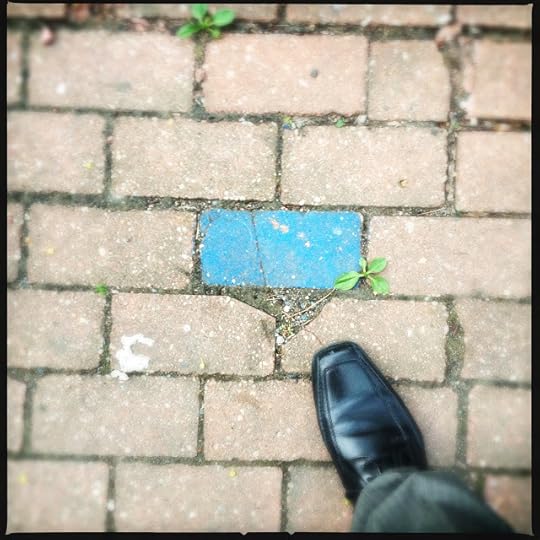"Tomorrow" is a Word that Must Always Appear between Quotation Marks
 Geof Huth, "Foot Points towards Blue" (15 April 2012)
Geof Huth, "Foot Points towards Blue" (15 April 2012)Albany International Airport, Gate B10, Colonie, New York
It is remarkable to me how I can revert to silence for such long times. But to do so right after saying I'd be back the next day to consider a puzzle I'd left on this page? Strange.
Somehow, I simply lost the will to write. It was not a compulsion, and I didn't push myself. I still wrote usually a number of pwoermds, and at least one, a day in celebration of International Pwoermd Writing Month, and I wrote a number of poems a sentence in length. Otherwise, I shut down business.
I should note that I said I'd come back "tomorrow," but as we all know from reading Through the Looking-Glass tomorrow never comes. There really is no tomorrow, only the concept of tomorrow. Today is a reality. And yesterday is the remembered reality of a today. But tomorrow is chimeric, vaporous, unreal.
So how did you ever expect me to respond "tomorrow"?
I have just learned that my flight out of Albany, New York, to Washington, D.C., has been delayed because of the transportation of the Shuttle Discovery to the Smithsonian today. Somehow, this seems an historic delay, but that is as much an illusion as "tomorrow" is. Since I had a 4¼-hour layover in D.C., and something to write while here, I don't mind the delay.
But I'm back to writing, at least for now. I have a little time as I await the departure of a flight, so I have plugged my computer into a socket, and I'm typing away. With one loud businessman and a quiet younger businesswoman talking directly towards me. The man is quite sure of himself in all ways. I already know I do not care for the man.
So the puzzle from last week seems on the face of it to be a mathematical puzzle. Various four-digit numbers are laid out for us, and they are shown to equal (=) certain single numerals from 0 on up. We might assume that some kind of numerological reduction of these numbers to single digits is at play, but a quick couple of tests proves that wrong. Other mathematical assumptions (value of the highest digit, value of the lowest, etc.) also prove pointless. Our analytical brains go in the direction of math, of the value of the numerals.
But the answer can be derived only by dispensing with that twisted sense of what is analytical.
I figured out the answer within two minutes because of the big hints in the puzzle. A number of four-digit numbers consisted of four of the same numerals, which forced a review of those numbers. Immediately, I saw the pattern, and it was visual. We had to count the "circles" in each of the numerals, so 0 equaled 1, 6 and 9 equaled 0, and eight equaled 2. What I find interested about this is that immediately I saw this and immediately I understood that 4 was a null value, because its enclosure was not a circle. I also knew that there were no half values assigned to 2 or 5 or the two halves of 3. Only full "circles" counted.
The answer was visual, and the mathematics involved was the simplest possible: counting.
In my test of people, which was poorly designed, provided me with no clear answers. Visual poets seemed to arrive at the conclusion within two or three minutes at the most, but so did many others, though to a lesser degree. The problem with the design of the test was that I told people what I was doing: testing the answers of visual poets versus all others. People thus expected a visual answer and, thus, appeared to have found it more quickly.
But some of those who were not visual poets appeared to never find the answer. The colleague of mine who sent the puzzle to me also sent the puzzle to her mother, a math teacher, and her mother didn't get it. My colleague herself, very smart and very analytical, gave up. The mathematicians always seemed to have troubles with the test.
So it seems to me that being a poet, visual and possibly also otherwise, might actually open the mind enough so that one is able to find answers that are seemingly non-analytical, that clear a new path, that don't quite add up as we expect the addition to work.
Now, soon, my trip to Grand Rapids will really begin.
ecr. l'inf.
Published on April 17, 2012 08:33
No comments have been added yet.



